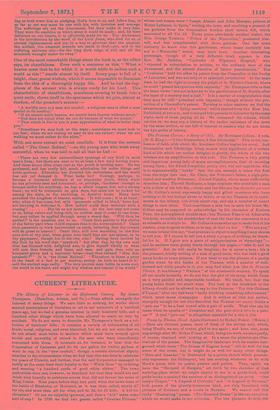The Princess Clarice : a Story of 1871. By Mortimer
Collins. 2 vols. (H. S. King.)—" I like Dreamshire, I like Idlebridge." This is the con- fession of faith with which Mr. Mortimer Collins begins his novel. And Dreamshire and Idlebridge being names very significant of a certain kind of life which our author delights to glorify, the whole of the two volumes are an amplification on this text. The Princess, a very pretty and imperious young lady of many accomplishments, that of canoeing among them ; her friend Josephine, pretty also, but not imperious, who is so supernaturally " handy " that she can manage a canoe the first time she steps into one ; Sir Clare, the Princess's father, a high-prin- cipled and wealthy Bohemian ; Colonel Paladin, whose name sufficiently describes him ; Thoralf Skolinson, a huge creature who could kill a man with a blow of his left fist,—these and the like are the dramatis per some of Mr. Collins's novel, supremely happy and gifted creatures who have nothing to do but lounge shoat on lawns, or on the Thames, or in apart- ments at the Albany, and drink claret-cup, and say a number of smart things to each other. That sometimes a man has to earn his bread Mr. Collins may be supposed to acknowledge by his character of Eustace Fane, the accomplished stockbroker ; but Eustaco Fane is an Admirable Crichton, so unlike the stockbroker of real life that the concession is not so valuable as it might be. Mr. Collins is somewhat apt to make fun of his readers, even to speak to them, so to say, de haut en bas. "Who are you," we seem to hear him say," that presume to object to anything I may choose to tell you. If I choose to tell you a story apropos of nothing, be thank- ful for it. If I give you a piece of antiquarianism or etymology "— and he scattere them pretty freely through his pages—" take it, and be grateful.'' But be will easily be forgiven ; he is never a bore ; his is the pleasant, kindly writing of a man of good taste, who has read a good many books to some purpose. If you want to see the picture of a pretty garden scene by the banks of the Thames, with a number of well- dressed and witty people in it, you may find what you like in Princess Clarice. It is a literary "Watteau " of tho nineteenth century. To speak all our minds honestly, we do not like the plot of his story, which turns on a very painful and improbable incident. We think, too, that the young ladies drink too much wine. The host at the breakfast in the Albany should not be allowed to say to the Princess, "Try this Chateau d'Yquem," after she had been "lazily drinking something effervescent," which must mean champagne. And it strikes us that our author, strangely enough for one who describes the Thames con amore, thinks a " pair-oar" to be a boat rowed with a pair of sculls. What else can he mean when he speaks of "Josephine and the poet tAte-h tete in a pair- oar "? A. real " pair-oar " is altogether unsuited for a tgte tate.


































 Previous page
Previous page